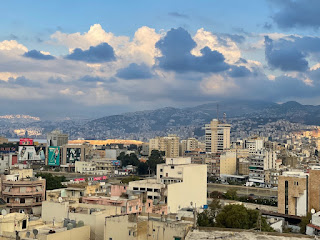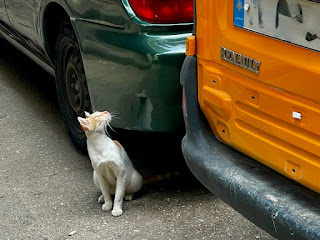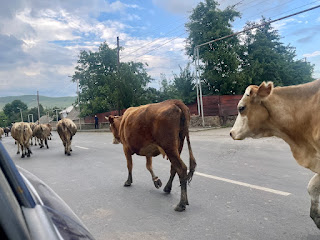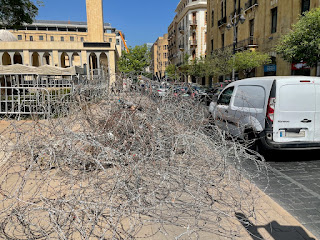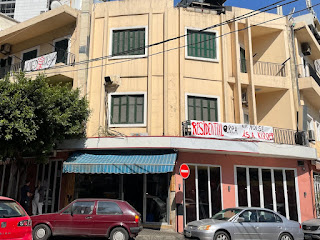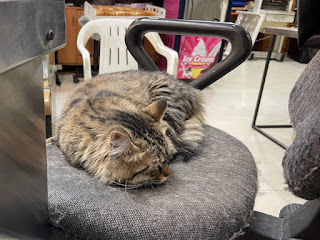55.Waiving the Flag (25 November 2022)
Now that World
Cup football (soccer for you Americans) has taken over the world for the coming
four weeks, enabling some pleasant diversion from the strangeness of these
times, Lebanon is once again subjected to the ineptitude of its kleptocracy. No
government here means no decision-making regarding broadcasting rights for the
World Cup on state television. Which means that football fans, of which there
are many, will not enjoy a month away from talk shows reviewing their all-too
familiar daily miseries. Daily cheering could provide positive, natural
chemicals to bring health to the tired bodies in this country, without having
to scour pharmacies for artificial remedies. Instead, a very few people with
the financial means to do so will watch the games at home, though many of them
will suffer with Lebanon’s insufferable internet speeds, with frozen screens
and with dropped connections. 
Preparing for school celebration of
Lebanon's Independence Day
(17 Nov. 2022 - Geitawi, Beirut)
A recent news report about this situation
in Lebanon showed photos of Lebanese with a multitude of flags of their
favorite teams while also recording the fans’ dismay at being deprived of the
tournament. They could paying for a month’s cable subscription in order to
watch it, but that would be tantamount to telling your family they will not eat
for a month. One person quipped, “Meanwhile our politicians are probably in
Qatar, watching the games live.”
"Green" transportation may not exactly mean
this (14 Nov. 2022 - Ghabi, Beirut)
It’s not surprising that Lebanese Independence Day, November 22, passed by this week with hardly a mention. Yes, there was a smattering of interesting broadcast advertisements with the independence theme, and an event or two was held for select groups of people. As always, students participated in their schools’ programs in observance of the day. There were even small Lebanese flags planted along traffic circles and roadsides. But there were no army parades or air force fly-overs, and no grandstands because empty chairs would have had to have been placed there for officials yet to be elected/appointed. What was in abundance were the many who expressed their dismay at the use of the word “independence” in today’s reality, since it is apparent to all that Lebanon’s problems and solutions are dependency issues, dependent on other, outside players. On Independence Day 2022 the flag was waived more than it was waved.
It’s encouraging to see that despite all of this, rather than
waiting for things to “get better,” people move forward to organize events and
activities. This is most apparent to us in our church and university settings,
though it is not limited to those circles. Concerts, plays, worship events, film
premieres, lectures, debates, leadership training, conferences, infrastructure
upgrades, publications, and of course, weddings! And this is just within the Lebanese-Armenian
community! None of this means that conditions are improving. The economy is still
floundering, the currency is still tumbling, the government is still
somnabulate, and youth are still edging towards the exit doors. But there is a
realization that consuming one’s time and energy in worry will not lengthen one’s
days, and will only yield regrets for things undone or unattempted. So, I am
glad when there are more activities that I want to attend than there is time to
attend them.
The best way to make music is to do it
yourself (13 Nov. 2022 - Geitawi, Beirut)
Despite these robust signs, the
present and future of the Armenian people is ever on my mind. For Armenia and
Artsakh, for the near Diaspora and the far. Few Armenians learn from their past,
though they study Armenian history in their school years. Names, places,
events, dates, enemies are never in short supply, and swirl around in the minds
of those with an Armenian education. But it is rare when your average “Hovsep”
can appreciate the myriad mistakes and missteps that Armenians have made over
the millennia, especially in the past century or two, up to this day, and then sketch
a wiser path forward. Alongside this general concern (dare I say “worry”?) I see
a glimmer of hope in my limited encounters with Armenian youth, as they wrestle
with questions that their history presents, note similarities with today’s
events, and ask “Can’t we do this differently?” Change will only happen when
people are free to ask questions and pursue answers, not when they line up in
rows and columns and follow leaders unthinkingly.
An imaginary cedar of Lebanon, perched on
a narrow outcropping of rock... perhaps not
imaginary at all (29 Oct. 2022 - Gemmayzeh)
Leaders clothe their self-interests
in patriotic rhetoric, and followers adopt that rhetoric, based on a limited
knowledge of the dynamics and background. For small and unimportant peoples
(like Armenia), the outcome is always in favor of those who can supply what
large entities want. Mostly that means that those who have oil resources are
treated with some deference, while those that don’t (like Armenia) have to
figure out if they have something to offer to satisfy ravenous appetites. This
is the way of the world, no matter that some consider themselves “exceptional”.
And this is why the church is so important (as long as it doesn’t play political
“world cup”), because it dares to love for God’s sake, not for gain.
Something for children to play with on the
steps, but is anybody listening at the other
end? (17 Nov. 2022 - Mar Mikhael, Beirut)
 |
| LebCat 55: That's my nickname, and, yes, that's my restaurant. (8 Oct. 2022 - Hamra) |

